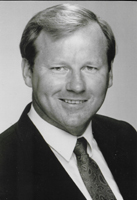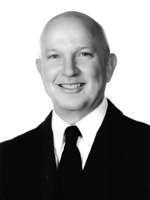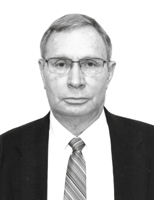 |
|||
 |
 |
 |
 |
Al Inkala Okemos |
Peter Militzer Portage Central |
Bill Riggs Allen Park |
Brook Smith West Iron County |
(click on Inductee's name to read 'description')
 |
|||
 |
 |
 |
 |
Al Inkala Okemos |
Peter Militzer Portage Central |
Bill Riggs Allen Park |
Brook Smith West Iron County |
(click on Inductee's name to read 'description')

 Al Inkala, Okemos High School
Al Inkala, Okemos High SchoolAl Inkala's funeral last June was understandably a somber affair. At age 66, he was, to employ a Southern expression, "done too soon." His loss was mourned by not only family, friends, and colleagues but legions of former players who held cherished memories. But more than one who attended that day looked at each other and said softly: "He can't say no now:'
They were referring to Al's reluctance to enter the Hall of Fame. In the summer of 2013, players, parents, and family put together an application and submitted it without his knowledge. In September, the MHSTeCA Executive Committee -- comprised of past presidents and present officers -- unanimously voted to include him in the Class of 2014. But to the committee's astonishment, Al asked that his induction be postponed for a year. A year later, he asked for a withdrawal. As he often said about personal honors, "It's about the kids."
The kids would respectfully disagree. "We had an amazing leader in Coach Inkala," writes Christine Bader, who played for Okemos from 2000 to 2003, for MSU from 2004 to 2008, and is currently head coach at Ball State University. "He coached with humor and kept tennis matches in perspective."
"Although his regional and state titles speak for themselves, Coach Inkala's success is better defined by what he gave to dozens of young women," writes Stephanie Kebler, varsity player for Okemos from 2001-2004 and our association's Miss Tennis in 2005. "At the end of every season, we left [the experience] better athletes and more confident young women."
They also left with multiple championships. Under Al's guidance, the Chieftains won six state titles - at one point, four in a row. They finished second four times. Thirty six of his kids won state flight championships. Despite this enormous success, the adjective most often used to describe him was modest.
To be sure, coaches who preside over teams blessed with talent and experience will testify that it isn't always easy in the face of high expectations and parental pressure. "As parents, we saw how our own two girls respected him and enjoyed him as their coach," write Al and Sondra Kearney.
But what might be most revealing about the man is how well he treated everybody, not just the star players. "I have personally witnessed Al go above and beyond to make student athletes feel welcomed and appreciated at any event in which he was in charge," writes MHSAA's Gina Mazzolini. "There were times when I had to fight back a tear when I saw this gentle giant try to make a five-footer feel that she was valued as a participant at the dual match, all this while he was coaching his own team."
"The stories heard around our office focused on how he worked to give Okemos' opponents the best experience possible when facing his incredibly talented teams," adds Geoff Kimmerly who worked with Al on tennis rankings at the Lansing State Journal. "He was the best of coaches when it came to being honest about his players' abilities and making sure those from other schools got deserved recognition as well. The Chieftains shared their equipment and knowledge with many opponents, providing humble leadership that embodied a coach who gave with little fanfare despite deserving much."
Induction into the Michigan High School Tennis Coaches Hall of Fame completes the "deserving much" part.
| Back to Top |
 Peter Militzer, Portage Central High School
Peter Militzer, Portage Central High SchoolAt the end of the 2015 girls season, Portage Central's team banquet, which usually lasts 2 to 2 %: hours, was extended another hour. That's because after the "normal" stuff, parents — one by one — stood up to praise their coach. It was a moving and much deserved tribute.
Indeed, the affair would have lasted substantially longer if prominent high school tennis coaches throughout the state had also been in the room. "Although I (thank goodness) never coached against Peter and his teams, I have over the years worked extensively with him in a variety of capacities with regard to our tennis association," says Ed Waits. "It didn't take me long to thoroughly admire his competence; his skills; his quiet, low-key administration of what we do; and his humorous self-deprecation. It is an understatement to say that he is the real deal in so many ways."
"I, too, never coached against Peter's teams, but he followed my term as President of the MHSTeCA so I got to know him well," says Nancy Brisette of Essexville Garber. "He was very organized, knowledgeable, fun to be around, and easy to work with. His attention to detail amazed me."
"One of my teams only competed once against one of Peter's," says Joe Gentle of North Muskegon. "As I recall, it didn't end well for us. More to the point, when he was President of the MHSTeCA, I was fortunate to serve as 1st Vice President under him. I was apprehensive about moving into the President position, but Peter made it easy for me by providing plenty of both verbal and organizational support. As President, I often contacted Peter for his input. When tackling tough issues, it was comforting to know that I could always rely on him for his wise counsel."
"Over the past many years, I've been impressed with the positive way Peter consistently relates with his -- and opposing -- players and coaches," says Jenison's Tom Leyrer. "He has shown great insight as a member -- and President -- of our coaches' organization. But most of all, I appreciate his sense of humor. He made tournaments and meetings more fun."
"He is a leader," says former secretary-treasurer Tiger Teusink. "When he speaks at our coaches association meetings, we listen. Peter's high integrity rating reflects his love for our game, his pursuit to maintain and improve the condition of our sport of tennis in Michigan, and the development of positive relationships among players, coaches, parents, and school administrators."
"Peter does a great job preparing his teams for competition, as has been shown by his team's accomplishments," says current secretary-treasurer Gary Ellis. "He works well at developing less-experienced players as well as improving the games of those who have played at the highest levels. He is very knowledgeable and is always willing to share his expertise with less-experienced coaches. He is well-organized and does things right, not just looking at the immediate situation but the big picture as well. He is a source of information as well as a voice of reason. He wins with class and on that rare occasion, loses with class.
Over 24 years (21 for girls), there hasn't been much losing: 47 as against 181 wins for boys; 60 losses as against 136 victories for his girls. In that time span, Peter's teams have brought home 16 regional championship trophies and qualified for state competition 25 times. His boys captured three state titles, including this past fall's campaign, a tie with Forest Hills Central. Overall, his teams have won 100 Saturday and conference tournaments. He has coached some of his kids to 12 state flight championships and 16 flight runners-up.
The coach of these tennis teams was himself a 1S player at Portage Central who went on to play a season at Kalamazoo Valley Community College where he ended up coaching the varsity girls squad (they qualified for nationals three times in Peter's four seasons) before coming back to his alma mater. From that time on, there was certainly a lot of success and it didn't go unrecognized: Boys Coach of the Year in 2000 and Girls COY in 2004. He was president of our organization from 2009 to 20011. He is Operations Director at the Kalamazoo YMCA, a position he has held since 2002. Among several of his areas of responsibility is tennis.
For over two decades, Peter has coached against some of the best: Gary Ellis, Dick Rossio, Al Pollard, Don Hudson, Mike McGinnis, Tom Leyrer, Jan Esper, Keith Bernacki, Tom Pullen, Dave Sukup, Tim Coleman, and Steve Bender. They all have something special in common. In terms of the Michigan High School Tennis Coaches Hall of Fame, Peter fits right in.
| Back to Top |
 Bill Riggs, Allen Park High School
Bill Riggs, Allen Park High SchoolRaised in Allen Park, Bill Riggs took up tennis as a 7th grader in a recreation program, a situation that would someday come full circle. He played 1S in high school for Ed Froshieser who eventually became a school board member. Ed convinced Bill to take the Girls JV tennis job, thus in effect launching his public school teaching and coaching career. In addition, Ron Pascuzzi, Bill's coach during his senior season, allowed him to work with the tennis team in the spring while Bill was finishing college. Between helping with the basketball team and the tennis team, he was hooked.
There were eight girls on Bill's first JV team but that number quickly grew in ensuing years until Bill took over the varsity. That same year, 60 girls signed up. Bill needed help and found it in the person of Hall of Famer Mike Hairabedian who had retired from Inkster Cherry Hill but welcomed the chance to stay in the game with limited responsibilities and pressure. Mike — a coach of 39 years who had given Bill his first penalty point when Bill competed in high school for Allen Park — stayed with Bill for eight seasons and together, they took a struggling program to one which has captured the league championship five times. The Jaguars went to the state finals for the first time in 1998.
Success has followed for the past 24 years, 21 for the girls. Bill's teams have notched 403 dual meet victories, captured 57 tournament trophies, won 19 league championships and 10 regionals, and appeared at the state tournament 21 times.
Make no mistake: Allen Park is not Ann Arbor or Okemos or East Grand Rapids or Bloomfield Hills. The coach makes the difference. "We were a strong team because of his strong will for us to do our best," says former player Molly Thomas. "As a senior player, I will never forget the time at state finals when I fought for that last point in my match to make Mr. Riggs proud of me."
"I grew tremendously over the four years that I played for Bill," says Mary Nydam. "He coached our team from a group of new-to-tennis freshmen and sophomores early on all the way to making a bid for the state championship my senior year for the first time in school history."
"While some coaches seek to find excuses for mistakes or losses, Coach Riggs never sugar coated reality," says former player Angela Hernandez. "Instead, he helped us find a way to identify and solve the problem which is a leadership trait I will forever respect and one that I try to embody in the corporate workplace every day."
Why the success? Commitment, hard work, and a strong will, of course, but also a little help from his friends. In addition to Mike (Hall of Fame Class of 1994), Bill also credits area coaches John Shade (Class of 1993), Jan Gottlin (2009), Tim Coleman (2002), and Al Kaye (2011) for providing excellent role models. "I wanted to surround myself with the best coaches and put a plan together to compete and maintain a level of excellence;' he said in 2005, the year he was selected as Girls Division 2 Coach of the Year.
He has also paid it forward. "In my four years playing for Allen Park, Coach Riggs gave me every opportunity to be as successful as possible on all levels," says Rocco Giorgi, who has gone on to coach varsity tennis at Gibraltar Carlson. "As a team, we made it to the state finals all four years and as an individual, I was able to play in the state finals all four years. Being from a non-tennis playing area in the state, this was an incredibly impressive feat."
Bill has been voted Regional Coach of the Year 18 times. 12 of his squads have been all academic. He is our association's historian. The Publications Advisor at his school, he arranges for the printing of our annual directory and the Hall of Fame banquet program.
What do Hall of Fame coaches have in common?
"I am where I am today in part because of the high standards that Coach Riggs held his athletes to," says Angela.
"Allen Park tennis would not be what it is today without Bill's exceptional coaching," says Mary.
"I never thought one person could make such an impact in my life as Mr. Riggs has done for me," says Molly.
| Back to Top |
 Brook Smith, West Iron County High School
Brook Smith, West Iron County High SchoolAt the end of certain MHSTeCA board meetings — regardless of where they were held -- Bob Wood would gesture to the coaches from the Upper Peninsula who had attended and say to the rest, "By the time you pull into your driveway, these guys won't be halfway home." At various times, he was referring to Bruce Farrell, Jack Tripp, Rich Trombly, ..... and Brook Smith. "I took the 800 mile round trip for about five years," Brook recalled years later. "It worked well because our team was the only school that played every school in the U.P. that had tennis."
This is a just one illustration of the many challenges that high school tennis coaches in the U.P. face in contrast to their counterparts in the Lower Peninsula. There is, of course, the often formidable weather which can limit opportunities for practice and competition. There is the scarcity of courts in many areas. There are considerable distances to get to an opponent's facilities. There are few if any indoor courts. And there is, often enough, a money problem. But for 17 seasons, Brook Smith more than coped with these obstacles, running an admirable program by doing the right things.
It certainly wasn't easy. "Each year, I had between 26-34 players on my team," he says. "The top 14 players practiced on our main courts. I would start these players on drills and then transport the other players to other courts, set up challenges for them, and then return to the main courts to conduct practice. At the end of practice, I would leave and pick up the rest of the team. When practice was over, I would stay and drill players and give individual lessons. I stayed until the last player left — usually about 6:30.
In other words, Brook practiced No-Cut before it became the staple of so many programs. "When we played matches, all players played," he says. "Each JV player played a set. I initiated a program with other schools where we took a bus and after the regular match, each extra player would play a set or match. They played in their challengeorder. If the other school didn't have enough JV players, then after a set I would put in different players to play the second set. Sometimes our JV players played their varsity players."
In time, other schools began transporting their teams in buses so that all JV players got to play. "This worked for us because our closest match was 45 miles one way and the longest was 120 miles one way. Most matches were around 80 miles."
Brook had to lend tennis rackets to some of his kids. If a player became really committed to the game, he would order a racket through a close-out sale. "I knew that in my community, if a player had to spend over $100 for a racket, most families would discourage their children from playing tennis," he says. "Some seasons, our entire team used the same brand of racket."
As with many programs, Brook promoted a summer program but he and his wife Jean did so for free so that no child was denied for lack of money. They usually had 40-50 players, running two sessions a day, one for beginners and one for advanced players. This was on four courts. He also lent his battery powered ball machine to one player for the summer. That player was responsible to pass it around, keep track of it, and keep it charged. "Every player who played high school tennis came from our summer camps," he says. "There was no other tennis instruction in the county."
Each year, Brook would take 4 to 7 of his local players to Boyne Mountain for the Wightman Cup try-outs. "They would play a round-robin against the top players north of Grand Rapids with the top seven making the team;' he says. "I always told these kids that they might not make the team but playing against top players would be invaluable."
Indeed, it was. Brook's high school girls rewarded their coach (and themselves) with 11 UP state championships and four 2nd place finishes. They compiled a 163-40-3 record from 1987 to 2003. His kids won 57 flight championships out of a possible 123 — 47% over 17 years.
Brook, who played high school tennis for Petoskey from 1957-1961, went on to play tennis and basketball at Northern Michigan University where he won the Michigan NAIA 4S title and qualified for the nationals in 1965. His doubles partner was Steve Contardi, who has been a tennis workshop clinician.
He had the pleasure of watching his daughter play at his alma mater. "When Nancy went to Northern, no player at No. 1 singles had ever won a match," he says. "In her first match at 1S, she won. She played No. 1 all four years at Northern."
Thanks to Don Elliot (Class of 1991), West Iron County had a strong tennis program before Brook took over the program. Brook did much more than merely maintain it. It is impressive that the school can boast not one but two coaches who are in the MHSTeCA Hall of Fame.
| Back to Top |